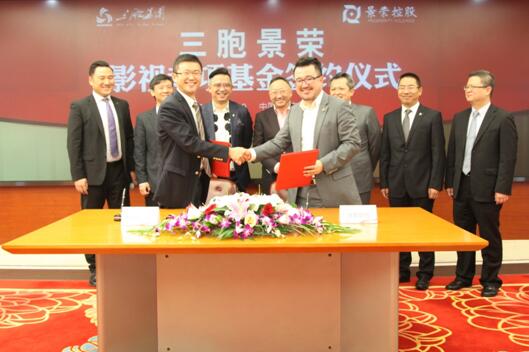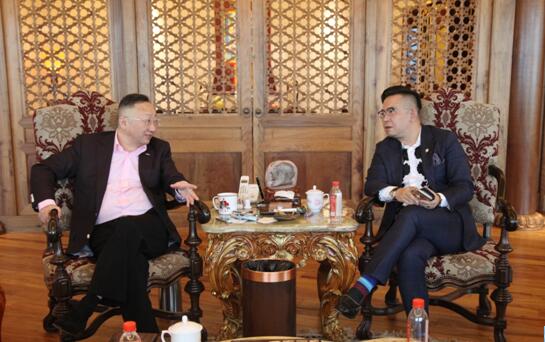Sanpower and Prosperity establish Film and Television Special Fund to exploit finance and cultural consumption markets
Time Published:2016-11-04Source:Author:
Browse:0 Print
Font Size:LargeMediumSmall
Recently, Sanpower Group signed a strategic cooperation agreement with Shanghai Prosperity Investment Holding Co., Ltd, and announced the establishment of the Sanpower Prosperity Film and TV Special Fund, which is committed to investment in the film and TV industry. Zou Yan, vice president of Sanpower Group, and Huang Jinbo, president of Prosperity Investment Holding Co., Ltd, represented the two parties in signing the agreement. Yuan Yafei, the chairman of Sanpower Group Yuan Yafei and Hu Jiangang, chairman of Prosperity Investment Holding Co., Ltd Hu Jiangang among others attended and witnessed the signing ceremony.

It is reported that the total fund will total RMB 500 million, while the initial raised fund is RMB 200 million. The focus of the fund is the film and TV cultural industries, especially investment in and the production of internet dramas and high quality films and TV series. Focusing on all video industries and drawing strength from powerful cinema chains, premium Satellite TV and internet platforms, the fund is going to build an investment and production system integrating “films + TV series + Internet dramas”.
Data indicates that the rises in citizen income has increased consumption, and spending on film, TV series, culture and entertainment fields has grown year on year. The national box office in 2015 was RMB 44,069 million in total, with year-on-year growth of 48.7%. The Chinese market for TV series in the same year reached about RMB 88.2 billion, including 379 self-produced Internet dramas, higher than the sum total of the previous eight years, showing a “blowout” trend.
Chinese consumption of film and television culture is exploding and the industry has making great amounts of money. In fact, in previous years, Sanpower Group had already begun positioning investment in the culture industry. On November 2010, Sanpower Group became a shareholder in Wanda Cinema Line by investing and increasing capital. Currently, Wanda Cinema Line has become the premier cinema chain in China. In addition, Sanpower Group has invested in many well-known domestic private equity funds or film and TV series funds. Through these funds, it holds about ten influential companies covering radio, film and television, cultural media and media advertising.
After many years of testing the water, Sanpower Group officially entered cultural industries in 2016. It is preparing to establish Sanpower Cultural Industry Group including many cultural subsidiaries, such as Borong Cultural Investment, Hongxinshengshi Media, Sanpower Junjian Fund and Sanpower Chutai Fund. It participates in the operations for China Newsweek and other well-known media and many new media platforms. According to Zou Yan, the vice president responsible for managing the cultural sector at Sanpower Group, Sanpower is relying on the advantages of its industrial ecosystem and capital drivers and is ultimately going to achieve strategic synergy with the group's main business by using real economy-based companies as a pivot, industry funds as a guide and project investment as the means to breakthrough.
“Though the fund was just established, during the earlier work, we have stockpiled many films and TV series, many of which are ambitious, star-studded works. There are senior producers and directors in the industry on our team. We are not only establishing a special fund focusing on video content, but also a first-rate domestic video content investor and manufacturer,” said Dong Wei, deputy head of the Culture and Entertainment Preparatory Group at Sanpower Group and general manager of Sanpower Junjian Investment Co., Ltd.

It is understood that Shanghai Prosperity Investment works in four fields, which are asset management, wealth management, financial services and industry investment. When the chairman of Sanpower Group Yuan Yafei met the chairman of Prosperity Hu Jiangang, both of the two parties said that in addition to the film and television culture industry, they hoped to develop closer cooperation in cinemas, commercial real estate and other fields to build an industrial ecosystem suited to the upgrade of national retail and structural reform of supply side.


